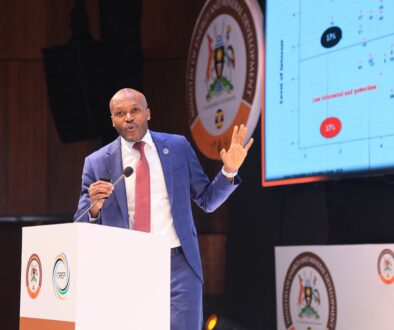Microfinance forum to streamline SME lending

CAPTION: Stakeholders during the launch at Hotel Africana Tuesday June 17th, 2025. (Photo: Stephen Wandera Ouma).
By Stephen Wandera Ouma
KAMPALA – Government has revived the Microfinance Forum (MFF), a multi-stakeholder platform established to enhance coordination among stakeholders in Uganda’s microfinance. According to State Minister Microfinance Haruna Kasolo the forum is to boost the sector infiltrated by fraud stars.
“The forum is to support the development of a robust, inclusive, and sustainable financial sector through policy dialogue, capacity building, advocacy, research, innovation, and strategic partnerships. It is to comprise government institutions regulators financial service providers’ umbrella bodies, development partners, civil society, educational and research institutions, private sector as well as community-based organizations,” he said.
Addressing stakeholders during the launch at Hotel Africana Tuesday June 17th, 2025, Kasolo used the platform to warn money lenders for ignoring government directive high interest rates. The event was organized Ministry of Finance Planning and Economic Development in conjunction with the Association of Microfinance Institutions of Uganda (AMFIU), an umbrella organisation of microfinance institutions (MFIs) in Uganda (AMFIU).
On 15th November 2024, the government issued Legal Notice No. 21 of 2024 to introduce interest rates cap for Tier 4 microfinance institutions and money lenders. The regulation limits interest rates to 2.8 per cent per month, or 33.6 per cent annually.

CAPTION: State Minister Microfinance Haruna Kasolo during the launch at Hotel Africana Tuesday June 17th, 2025. (Photo: Stephen Wandera Ouma).
Although the move is intended to protect borrowers from predatory lending, it may turn out to be a double-edged sword in a country with a narrow credit market, especially for smaller businesses and unbanked individuals. Before the cap, borrowers often faced monthly interest rates exceeding 20 per cent, with annualized rates surpassing 100 per cent.
“You find a money lender charging exorbitant interest rates. These rates are illegal, the government is coming for you. I direct all Resident District Commissioners (RDC) to arrest anyone found charging these high interest rates,” he said.
The predatory practices perpetuated cycles of debt, especially for women in small businesses, small holder farmers, informal traders, and low-income earners who rely on credit to sustain their livelihoods. President Museveni rightly likened money lenders to ‘vultures’ preying on vulnerable Ugandans.
For borrowers, the new policy is a significant step forward. By capping interest rates at 33.6 per cent annually, the government could encourage more Ugandans to turn to formal financial institutions, thereby advancing financial inclusion in a country where informal lending remains dominant.
According to the FinScope 2023 survey, approximately 52 per cent of Ugandan adults, equating to 12.8 million individuals, utilize informal financial services. There are downsides to this well-intended reform. The microfinance sector faces significant operational challenges, including high operational costs, inadequate infrastructure, small loan sizes, and high repayment risks.
CAPTION: Boda boda riders go past President Yoweri Museveni billboard along Nile Avenue in Kampala Tuesday June 117th 20225. (Photo by Stephen Wandera Ouma).
To address these challenges, Kasolo said President Museveni is to launch boda boda and market vendors’ loan scheme on a pilot scheme that could be rolled upcountry.
Mr Jonan AKandwanaho, the President, Association of Money Lenders in Uganda acknowledged the challenge but distanced the association’s members from the acts.
“We ensure that our members are not involved in such illegalities, it is a requirement,” he said.
Many lenders argue a monthly cap of 2.8 per cent does not adequately cover these costs and the attendant risks, threatening their survival. If lenders withdraw from underserved areas due to financial strain, borrowers may face reduced access to credit, undermining the regulation’s goal of promoting financial inclusion.
Another concern is the potential reduction in credit supply. With limited returns under the cap, lenders may become more risk-averse, opting to exclude borrowers without collateral, proven credit histories, or proof of income. This could disproportionately affect women in small businesses, small holder farmers, and informal traders who rely on unsecured loans.
Andrew Obara, Managing Director, FRIENDS Consult Ltd called for reliable national data and information systems as well as training for financial literacy if the sector is to be streamlined.
CAPTION: Andrew Obara, Managing Director, FRIENDS Consult Ltd during the launch at Hotel Africana Tuesday June 17th, 2025. (Photo: Stephen Wandera Ouma).




